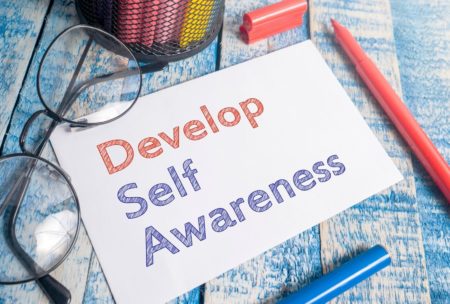This course is designed for those interested in learning how to develop self awareness. Read more.
Hi. My name is Robin Hills. I am an emotional intelligence coach, trainer and facilitator with over 35 years business and commercial experience.
Access all courses in our library for only $9/month with All Access Pass
Get Started with All Access PassBuy Only This CourseAbout This Course
Latest update – January 2022
Making sense of who you are in the world involves a good level of self-awareness; knowing your values and how your strengths and weaknesses can support you or limit you in your life.
How you manage yourself – your thoughts and your feelings – depends on how well you understand your emotions, how you control them and how you use them as you make your way through life.
It is one of the ways that you use your emotional intelligence. The course covers the awareness part of how you manage your inner world of being.
This course is a stand-alone course for anyone interested in understanding themselves better and determining their core purpose, vocation or destiny in life. It forms part of a comprehensive course that explores emotional intelligence in more depth.
Emotions are not about being soft and fluffy, they are vital in helping you to make hard, direct management decisions. Managing your emotions well can mean managing your life with more influence and impact.
In this course, we will explore the way that you manage your emotions and how this drives your self-confidence, your beliefs about yourself, and how you work with your life goals. You will also be taken through an understanding of your behavioral preferences to determine your personality type. This will give you more self-awareness, a better understanding of yourself and others and will help you to make sense of who you are in the world.
You’ll receive all the information that you need and will be coached using loads of practical hints that you can use straight away.
The course is made up of a series of lectures. There are a series of interactive exercises that involve some activity with other people and some reflection.
The course material makes up a one to two-day workshop so is equivalent to 8 -12 hour’s training. It forms part of our advanced emotional intelligence course endorsed by the Institute of Leadership and Management.
PLEASE NOTE – This course is NOT for you if you are not prepared to work through the exercises that make up a fundamental part of the course. Self-awareness cannot be developed by watching a few video lectures. The course requires you to do some reflective thinking, to get some feedback and to discuss your development with others. I’m afraid that you won’t get the best from the course unless you are prepared to do this.
There are SEVEN practical activities included within the course that are designed to help you to develop your self-awareness. All the activities require you do some work outside of the course.
These are:
- Reflecting about this Emotional Intelligence Course
- Assessing your Self Perception
- Working with your Values
- Emotions and their Management
- Determining your Behavioural Preferences
- Defining your Life Goals
- Learning Review
The course is being continually refined and updated to ensure it remains current and relevant.
Our Promise to You
By the end of this course, you will have learned how to develop self-awareness.
10 Day Money Back Guarantee. If you are unsatisfied for any reason, simply contact us and we’ll give you a full refund. No questions asked.
Get started today and learn how to develop self-awareness!
Course Curriculum
| Section 1 - Introduction To The Course | |||
| Introduction To The Course | 00:00:00 | ||
| Emotional Intelligence Framework And The EQ-i 2.0 | 00:00:00 | ||
| How The Course Relates To Self-Awareness And Self-Perception | 00:00:00 | ||
| Investigating Self-Awareness | 00:00:00 | ||
| Section 2 - Exercise: Self Perception | |||
| Assess Your Self-Perception | 00:00:00 | ||
| Section 3 - Boosting Your Self-Confidence | |||
| Self-Regard – Learning Outcomes | 00:00:00 | ||
| Some Examples Of Self-Regard In Action | 00:00:00 | ||
| Good Levels Of Self-Regard | 00:00:00 | ||
| Self-Limiting Beliefs – How Your Beliefs Can Get In The Way | 00:00:00 | ||
| The Johari Window – Insights Into Your Relationship With Yourself And With Others | 00:00:00 | ||
| Understanding Values | 00:00:00 | ||
| Self-Regard – Review Of This Module | 00:00:00 | ||
| Section 4 - Exercise: Self Regard | |||
| Working With Your Values | 00:00:00 | ||
| Section 5 - Management And Awareness Of Your Emotions | |||
| Emotional Self-Awareness – Learning Outcomes | 00:00:00 | ||
| Some Examples Of Emotional Self-Awareness | 00:00:00 | ||
| The Basic Anatomy Of The Brain | 00:00:00 | ||
| The Basic Human Emotions Experienced By Everyone | 00:00:00 | ||
| The Development And Function Of Emotions | 00:00:00 | ||
| Emotional States, Moods, Traits, And Styles | 00:00:00 | ||
| How Emotions Are Viewed | 00:00:00 | ||
| Noticing Feelings | 00:00:00 | ||
| Managing Emotions | 00:00:00 | ||
| Mastering Emotions | 00:00:00 | ||
| Detachment | 00:00:00 | ||
| Emotional Self-Awareness – Review Of This Module | 00:00:00 | ||
| Section 6 - Exercise: Emotional Self-Awareness | |||
| Emotions And Their Management | 00:00:00 | ||
| Section 7 - Self-Actualization | |||
| Self-Actualization – Learning Outcomes | 00:00:00 | ||
| Some Examples Of Self-Actualization | 00:00:00 | ||
| What Is Your Core Purpose Or Vocation In Life? | 00:00:00 | ||
| Goals And Goal Setting | 00:00:00 | ||
| Understanding Goal Setting And Planning | 00:00:00 | ||
| Exploring Beliefs | 00:00:00 | ||
| Visualisation | 00:00:00 | ||
| How To Rewire Your Brain | 00:00:00 | ||
| Using Affirmations To Change Your Beliefs | 00:00:00 | ||
| Self-Actualization – Review Of This Module | 00:00:00 | ||
| Section 8 - Exercise: Defining Your Life Goals | |||
| Defining Your Life Goals | 00:00:00 | ||
| Section 9 - Making Sense Of Who You Are In The World | |||
| Conclusion To The Course | 00:00:00 | ||
| 10 Tips For Improving Your Self-Awareness | 00:00:00 | ||
About This Course
Latest update – January 2022
Making sense of who you are in the world involves a good level of self-awareness; knowing your values and how your strengths and weaknesses can support you or limit you in your life.
How you manage yourself – your thoughts and your feelings – depends on how well you understand your emotions, how you control them and how you use them as you make your way through life.
It is one of the ways that you use your emotional intelligence. The course covers the awareness part of how you manage your inner world of being.
This course is a stand-alone course for anyone interested in understanding themselves better and determining their core purpose, vocation or destiny in life. It forms part of a comprehensive course that explores emotional intelligence in more depth.
Emotions are not about being soft and fluffy, they are vital in helping you to make hard, direct management decisions. Managing your emotions well can mean managing your life with more influence and impact.
In this course, we will explore the way that you manage your emotions and how this drives your self-confidence, your beliefs about yourself, and how you work with your life goals. You will also be taken through an understanding of your behavioral preferences to determine your personality type. This will give you more self-awareness, a better understanding of yourself and others and will help you to make sense of who you are in the world.
You’ll receive all the information that you need and will be coached using loads of practical hints that you can use straight away.
The course is made up of a series of lectures. There are a series of interactive exercises that involve some activity with other people and some reflection.
The course material makes up a one to two-day workshop so is equivalent to 8 -12 hour’s training. It forms part of our advanced emotional intelligence course endorsed by the Institute of Leadership and Management.
PLEASE NOTE – This course is NOT for you if you are not prepared to work through the exercises that make up a fundamental part of the course. Self-awareness cannot be developed by watching a few video lectures. The course requires you to do some reflective thinking, to get some feedback and to discuss your development with others. I’m afraid that you won’t get the best from the course unless you are prepared to do this.
There are SEVEN practical activities included within the course that are designed to help you to develop your self-awareness. All the activities require you do some work outside of the course.
These are:
- Reflecting about this Emotional Intelligence Course
- Assessing your Self Perception
- Working with your Values
- Emotions and their Management
- Determining your Behavioural Preferences
- Defining your Life Goals
- Learning Review
The course is being continually refined and updated to ensure it remains current and relevant.
Our Promise to You
By the end of this course, you will have learned how to develop self-awareness.
10 Day Money Back Guarantee. If you are unsatisfied for any reason, simply contact us and we’ll give you a full refund. No questions asked.
Get started today and learn how to develop self-awareness!
Course Curriculum
| Section 1 - Introduction To The Course | |||
| Introduction To The Course | 00:00:00 | ||
| Emotional Intelligence Framework And The EQ-i 2.0 | 00:00:00 | ||
| How The Course Relates To Self-Awareness And Self-Perception | 00:00:00 | ||
| Investigating Self-Awareness | 00:00:00 | ||
| Section 2 - Exercise: Self Perception | |||
| Assess Your Self-Perception | 00:00:00 | ||
| Section 3 - Boosting Your Self-Confidence | |||
| Self-Regard – Learning Outcomes | 00:00:00 | ||
| Some Examples Of Self-Regard In Action | 00:00:00 | ||
| Good Levels Of Self-Regard | 00:00:00 | ||
| Self-Limiting Beliefs – How Your Beliefs Can Get In The Way | 00:00:00 | ||
| The Johari Window – Insights Into Your Relationship With Yourself And With Others | 00:00:00 | ||
| Understanding Values | 00:00:00 | ||
| Self-Regard – Review Of This Module | 00:00:00 | ||
| Section 4 - Exercise: Self Regard | |||
| Working With Your Values | 00:00:00 | ||
| Section 5 - Management And Awareness Of Your Emotions | |||
| Emotional Self-Awareness – Learning Outcomes | 00:00:00 | ||
| Some Examples Of Emotional Self-Awareness | 00:00:00 | ||
| The Basic Anatomy Of The Brain | 00:00:00 | ||
| The Basic Human Emotions Experienced By Everyone | 00:00:00 | ||
| The Development And Function Of Emotions | 00:00:00 | ||
| Emotional States, Moods, Traits, And Styles | 00:00:00 | ||
| How Emotions Are Viewed | 00:00:00 | ||
| Noticing Feelings | 00:00:00 | ||
| Managing Emotions | 00:00:00 | ||
| Mastering Emotions | 00:00:00 | ||
| Detachment | 00:00:00 | ||
| Emotional Self-Awareness – Review Of This Module | 00:00:00 | ||
| Section 6 - Exercise: Emotional Self-Awareness | |||
| Emotions And Their Management | 00:00:00 | ||
| Section 7 - Self-Actualization | |||
| Self-Actualization – Learning Outcomes | 00:00:00 | ||
| Some Examples Of Self-Actualization | 00:00:00 | ||
| What Is Your Core Purpose Or Vocation In Life? | 00:00:00 | ||
| Goals And Goal Setting | 00:00:00 | ||
| Understanding Goal Setting And Planning | 00:00:00 | ||
| Exploring Beliefs | 00:00:00 | ||
| Visualisation | 00:00:00 | ||
| How To Rewire Your Brain | 00:00:00 | ||
| Using Affirmations To Change Your Beliefs | 00:00:00 | ||
| Self-Actualization – Review Of This Module | 00:00:00 | ||
| Section 8 - Exercise: Defining Your Life Goals | |||
| Defining Your Life Goals | 00:00:00 | ||
| Section 9 - Making Sense Of Who You Are In The World | |||
| Conclusion To The Course | 00:00:00 | ||
| 10 Tips For Improving Your Self-Awareness | 00:00:00 | ||





this subject should be taught more
this is a great course and the world needs more of this.
self awareness through emotional intelligence
Great course, very helpful in identifying how others think and why at times we have trouble communicating. Thanks, Helen
self awareness
this course has helped to see my strength and weaknesses and the exercise are useful. 5*****
Great Course
While the content of this course was review for me in many ways, it was very helpful in pushing me to develop goals for my life which are SMART. I recommend this to anyone who wants to better understand who they are and how they can be better at what they do.